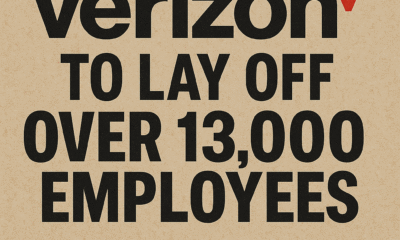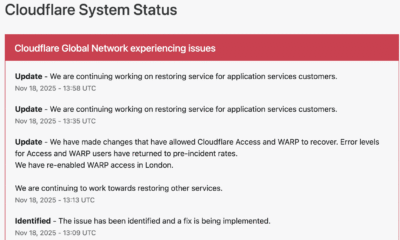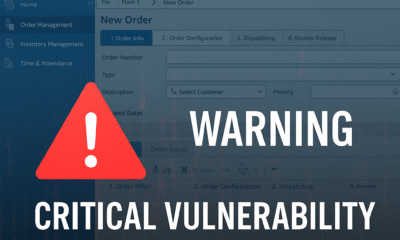ART & CULTURE
Are Morocco’s Cyber Offices Compromising Your Identity? The Alarming Truth
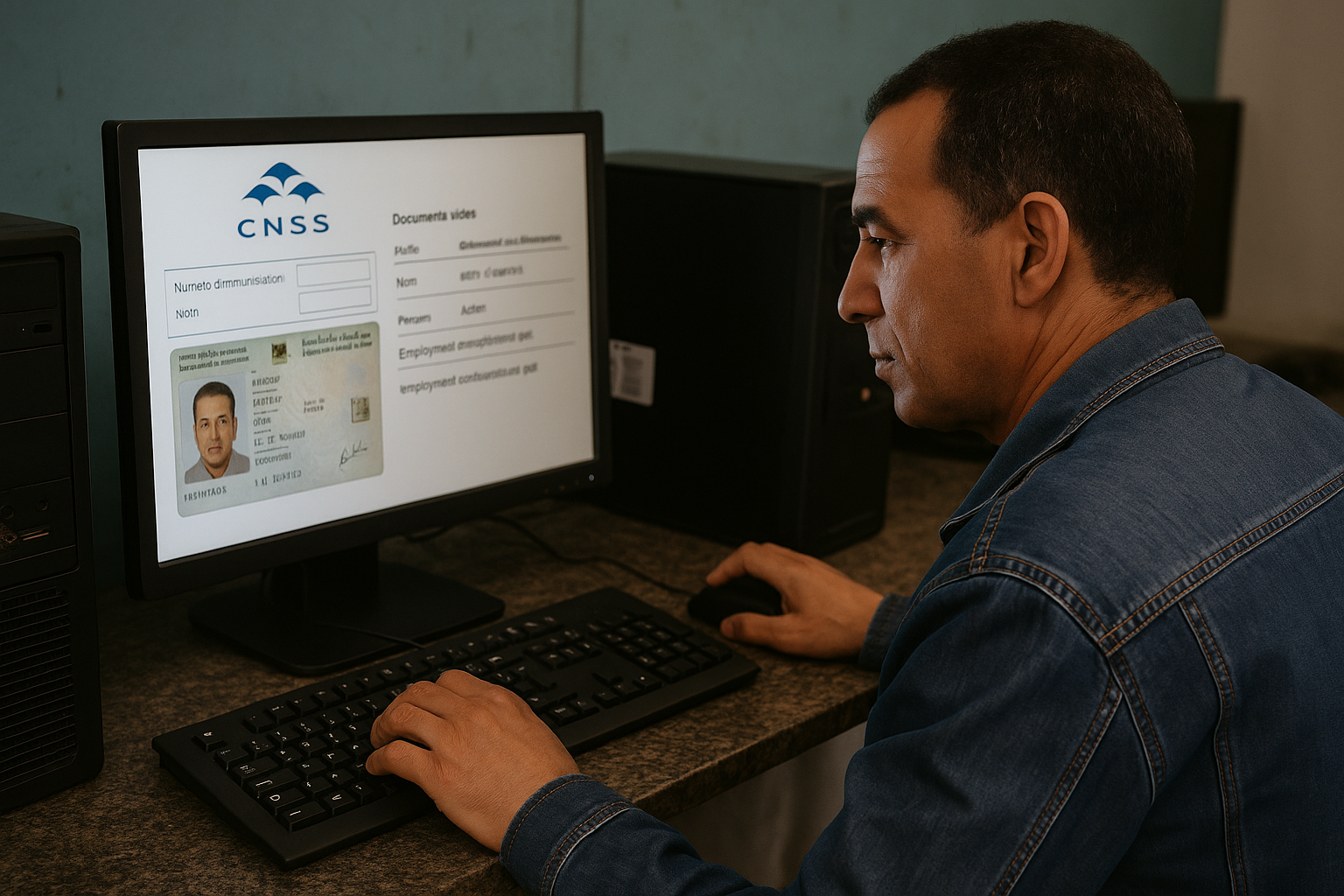
As Morocco’s citizens turn to cyber offices to access essential public services, sensitive personal data may be at risk—raising urgent questions about digital security, regulatory gaps, and accountability.
Rabat, Morocco —
In an age where data is currency, Moroccan citizens may be handing over the keys to their digital identity—without realizing it.
The rise of bureaux de cybers, or cyber offices, across Morocco has provided millions of Moroccans with access to essential digital platforms linked to government services such as CNSS (social security), CNIE (national ID renewals), ANCFCC (land registry), and civil status portals. But behind this façade of convenience lies an alarming truth: your personal data—ID cards, family records, employment history, tax documents, and even biometric scans—may be exposed, stored, or even sold, with minimal oversight.
How Your Data Is Being Exposed
When a citizen walks into a cyber office for assistance with submitting a state form or uploading required documents, they often:
- Hand over national ID scans, birth and marriage certificates, family books, or employment contracts.
- Share email credentials, CNSS login info, or bank statements.
- Allow the agent to create, access, and submit government applications on their behalf.
While this may seem like a simple exchange of services, the real danger lies in what happens afterward. Many of these offices operate without regulation or accountability:
- Personal data is saved on public, often unsecured computers.
- Files are stored in shared folders or flash drives, vulnerable to malware or theft.
- Agents may reuse documents, resell data, or even trade access credentials with third parties.
“Most people don’t even ask what’s being done with their data,” says Khadija Marnissi, an independent privacy researcher in Casablanca. “There is no formal consent. No encryption. No guarantee that their documents will be deleted.”
The Hidden Ecosystem of Data Brokers
In recent years, Morocco has witnessed the emergence of an underground digital marketplace where personal data is bought and sold. Names, phone numbers, ID numbers, and social security info are traded by:
- Fraudsters conducting identity theft and social engineering scams.
- Informal recruiters seeking background information on candidates.
- Third-party companies building marketing or political databases.
“You may think you just paid 20 dirhams to file your CNSS online,” says Driss El Hadi, a cybersecurity professor at ENSIAS. “But behind the scenes, your profile might be circulating on WhatsApp groups or used in phishing campaigns.”
Who’s Responsible for This Vulnerability?
Responsibility lies across multiple levels:
- The Government:
While Morocco’s Ministry of Digital Transition has pushed for widespread e-governance adoption, it has not yet implemented standardized privacy regulations, nor has it formally registered or supervised cyber offices. Platforms like www.cnss.ma and www.nar.sa assume the user is the sole operator—ignoring real-world digital literacy gaps. - Cyber Office Operators:
Most operators are not trained in data protection or cybersecurity hygiene. Few offer privacy disclaimers or use secure deletion software. Many rely on outdated PCs, free software, and unprotected Wi-Fi networks. - End Users:
Many citizens lack awareness of the risks of sharing sensitive data. In the absence of accessible digital education, they trust intermediaries without understanding the long-term implications.
What Can Be Done to Protect Your Identity
For Citizens:
- Never share passwords or login credentials with third parties.
- Request your documents be deleted after use or carry a USB drive to prevent leaving copies behind.
- Use incognito browsing and insist on official portals.
- Monitor your digital identity, especially CNSS or bank activity, for unusual changes.
For the Government:
Enforce Law 09-08 with stricter penalties for unauthorized data handling.
- Enforce data protection laws that require encryption, consent, and usage tracking.
- Launch certification and regulation programs for cyber offices.
- Offer state-run access kiosks with privacy safeguards.
- Fund national digital literacy campaigns, especially in rural areas.
For Cyber Office Operators:
- Install firewalls and antivirus solutions.
- Use secure document management systems that automatically erase files post-processing.
- Display clear data privacy policies to clients.
- Undergo training and certification in data ethics and user protection.
A National Digital Crossroads
Morocco’s ambitions for a paperless, efficient e-government are laudable. But without the proper privacy frameworks, digital transformation risks becoming digital exploitation. Citizens, particularly the vulnerable and digitally illiterate, must be protected—not forced to trade privacy for public access.
Morocco is at a crossroads: either it ensures privacy and cybersecurity are built into every public service, or it risks undermining trust in its digital infrastructure. For services like CNSS, citizens should never have to choose between access and safety.
ART & CULTURE
Morocco to Spotlight Global South’s Role in Turbulent Times at MEDays 2025
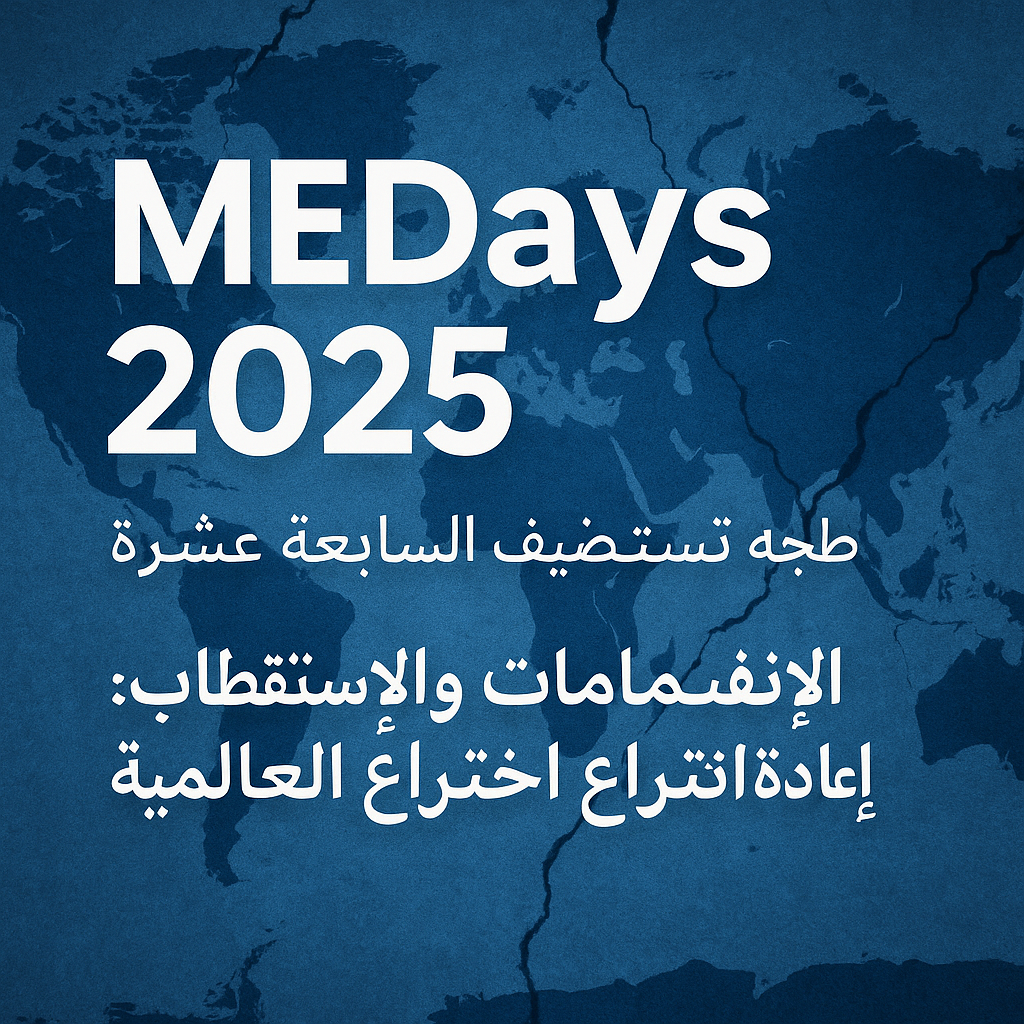
From conflict zones to climate diplomacy, the 2025 MEDays Forum will bring world leaders and experts to Morocco to rethink global stability and redefine the role of the Global South.
🌍 Tangier, Morocco — July 27, 2025
In a world increasingly fractured by geopolitical rivalries, wars, and economic uncertainty, Tangier is set to become the global stage for dialogue, diplomacy, and strategic vision. From November 26 to 29, 2025, the Moroccan port city will host the 17th edition of the MEDays Forum, under the evocative theme:
“Fractures and Polarization: Reinventing the Global Equation.”
Organized by the Amadeus Institute, this year’s forum arrives at a pivotal moment in world affairs. From the war in Ukraine to unrest in the Sahel, from the rise of populism to the weaponization of energy, the world faces a cascade of crises. The forum aims to confront these fractures head-on and propose actionable frameworks to address the new global disorder.
“This edition will serve as a critical platform to debate the future of international governance and the place of the Global South within it,” said Brahim Fassi Fihri, President of the Amadeus Institute.
🔹 A Platform for Multipolar Dialogue
With over 300 speakers, including heads of state, ministers, diplomats, academics, and CEOs, MEDays 2025 is expected to draw more than 7,000 participants from over 120 countries.
Key topics include:
- Geopolitical reordering and power vacuums
- Energy transition and climate instability
- Digital sovereignty and cyber conflicts
- Multilateralism vs. regionalism
- Africa’s voice in shaping global governance
As global institutions struggle to keep pace with shifting realities, MEDays offers what many consider a “Davos for the Global South”—a rare venue where perspectives from Africa, Asia, and Latin America drive the conversation.
🔹 Morocco’s Growing Strategic Role
Morocco’s choice as host is no coincidence. Over the past decade, the North African kingdom has positioned itself as a bridge between continents, a gateway to Africa, and a leader in renewable energy diplomacy.
“Hosting MEDays reaffirms Morocco’s commitment to multilateral dialogue and regional leadership in times of global polarization,” noted political analyst Dr. Nadia Lakhdar.
Tangier’s transformation into a high-tech and logistics hub further solidifies its role as a venue where ideas, influence, and innovation intersect.
🔹 Human Impact and Urgency
Beyond the headlines, the geopolitical fractures the forum will address are deeply human. Conflicts have displaced over 110 million people globally, while climate-related disasters have affected millions more. Youth unemployment, inflation, and debt crises burden entire regions—especially in Africa and the Middle East.
“We can’t talk about geopolitics in isolation. Every fractured policy or failed dialogue creates ripple effects felt by the most vulnerable,” said Fatima Al-Khatib, a youth activist from Jordan participating in the forum.
MEDays 2025 is expected to propose tangible policy frameworks, multi-stakeholder cooperation models, and public-private partnerships to address urgent global challenges.
ART & CULTURE
“We’ve Had Enough”: Moroccan Immigrants Protest With Their Absence

Rising airfare, political frustration, and lack of confidence in public services push thousands of Moroccan immigrants to skip summer visits home
By El Mostafa Ouchen | Rabat / Paris / Amsterdam / Montréal
RABAT – For decades, summer in Morocco has been defined by a vibrant homecoming ritual: airports buzzing with arrivals, highways jammed with rental cars, and families embracing across generations. But in 2025, that emotional annual migration is faltering. From Paris to Toronto, Brussels to Barcelona, Moroccan immigrants are increasingly choosing not to return home this summer.
“This is the first time in 18 years I won’t be going back,” said Amina M., a nurse living in Lille, France. “It’s not just the price — it’s the feeling that Morocco has turned its back on people like us.”
🚫 Soaring Costs and Systemic Barriers
At the heart of the no-return movement lies economic hardship. Roundtrip flights from Europe to Morocco have nearly doubled in price this year. In early July, economy tickets from Brussels to Casablanca were selling for €780 to €1,200, compared to €300–€400 last year.
Meanwhile, ferry operators from Spain to Tangier raised rates by over 45%, citing fuel costs and seasonal demand. For a family of five traveling by car, the total cost can now exceed €2,500, even before accommodations, gifts, or travel within Morocco.
“The bled has become luxury,” joked Karim Belkadi, a Moroccan living in Rotterdam. “We work all year, and we’re punished for wanting to visit our parents.”
🗺️ Deeper Discontent: Bureaucracy, Corruption, and Lack of Change
Beyond financial concerns, emotional and political fatigue is a powerful factor. Many Moroccan expatriates say they feel ignored, or even exploited, by a system that praises their remittances but disregards their concerns.
Issues cited include:
- Customs harassment at border points
- Corruption in port and airport inspections
- Poor infrastructure and medical access in rural hometowns
- Lack of legal recognition for diaspora contributions or dual nationality rights
“We send billions in remittances, but what do we get? Broken roads and disrespect at the border,” said Samira El-Haddadi, a Moroccan-Canadian based in Montreal.
According to Bank Al-Maghrib, Moroccans abroad sent MAD 100 billion ($10B USD) in remittances last year — a record sum — making them the country’s top source of foreign currency.
Yet many say their loyalty is wearing thin.
👥 The Silent Boycott — and Its Consequences
Online, the movement is growing under hashtags like #MREBoycott2025, #BladiBghatniFlouss, and #StayHomeThisSummer. Social media platforms like TikTok and Instagram are filled with Moroccan immigrants urging others to “make a statement” by not returning.
Economists warn the absence of diaspora spending will impact:
- Local tourism
- Rural economies
- Seasonal employment in service sectors
“The Moroccan diaspora are not just tourists. They are cultural and economic lifelines,” said Dr. Nour El Bakkali, a migration policy expert at Hassan II University. “Ignoring their grievances is a strategic error.”
⏳ Will Things Change?
So far, officials have responded with silence or defensiveness. An attempt by the Ministry of Moroccans Residing Abroad to address the concerns was met with mockery after it launched an “Appreciate Your Homeland” campaign on Instagram — with comments disabled.
Back in France, Amina M. summarized the sentiment best:
“We love Morocco. But this summer, love is not enough.”
ART & CULTURE
New Diplomatic Momentum: Portugal Supports Morocco’s Autonomy Framework for Sahara
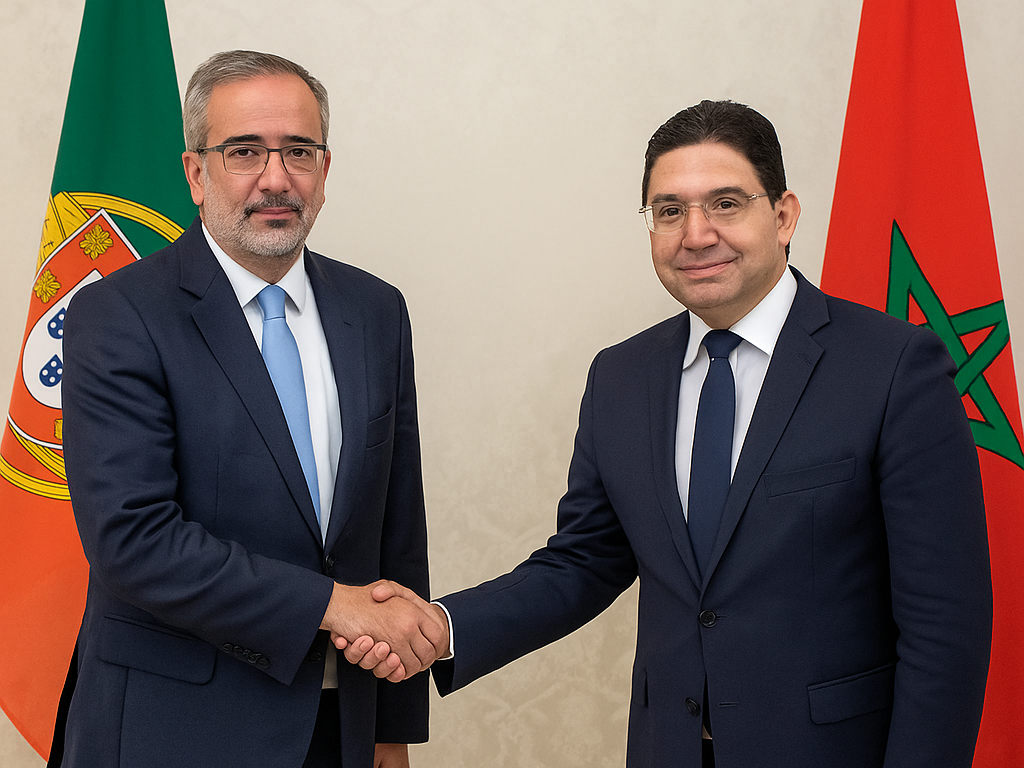
Lisbon bolsters regional diplomacy with full endorsement, while humanitarian stakes rise
📰 Lisbon Backs Rabat in Key Diplomatic Shift
A fresh wave of cautious optimism emerged across Western Sahara this week after Portugal reaffirmed its support for Morocco’s 2007 autonomy initiative. In an official visit to Lisbon on July 22, 2025, Moroccan Foreign Minister Nasser Bourita was welcomed by his Portuguese counterpart Paulo Rangel, with both sides issuing a joint declaration calling the autonomy proposal the “most serious, credible, and constructive” solution to the long-standing dispute.
This development places Portugal among a growing list of European nations—including France, Spain, and the United Kingdom—that have shifted toward supporting Morocco’s framework for peace under United Nations auspices.
📌 Key Facts & Diplomatic Milestones
- Date of meeting: July 22, 2025, Lisbon
- Officials present: Paulo Rangel (Portugal), Nasser Bourita (Morocco)
- Official statement: Portugal affirms Morocco’s autonomy initiative as a solid basis for resolving the Sahara conflict under the UN framework
- What the plan entails: Autonomy for Western Sahara under Moroccan sovereignty, with elected local governance over civil matters, while Morocco retains control of defense, diplomacy, and religion
- Portugal’s position: Stops short of full sovereignty recognition but aligns with other European partners
The endorsement signals a notable step in Portugal’s foreign policy approach and adds momentum to Morocco’s international diplomatic strategy.
🗣️ Voices and Perspectives
Speaking in Lisbon, Portuguese Foreign Minister Paulo Rangel said:
“Following moves by France, Spain, and the United Kingdom, Portugal affirms that Morocco’s autonomy plan is the most serious basis for a solution—within the framework of the United Nations.”
Political expert José Tomaz Castello Branco noted:
“This positions Portugal firmly among European allies favoring a political resolution. It also leaves room for Lisbon to adjust its position as the UN process unfolds.”
🧍♂️ Human Impact on the Ground
For residents of Western Sahara, especially those in refugee camps or under uncertain administrative conditions, this diplomatic recognition brings a renewed sense of hope. Humanitarian groups have welcomed the news, noting that political stabilization could finally unlock sustained access to healthcare, education, and infrastructure development—long impeded by regional instability.
However, the Polisario Front—a separatist group backed by Algeria—remains opposed to the plan, insisting on full independence for the Sahrawi people. Activists warn that any plan must be implemented with guarantees of rights, dignity, and local agency.
🌍 Background: A Conflict Spanning Decades
The Western Sahara conflict began in 1975 after Spain’s withdrawal. Morocco took administrative control of the territory, but the Polisario Front declared the Sahrawi Arab Democratic Republic (SADR) in 1976, leading to years of conflict and ongoing diplomatic gridlock.
Morocco’s autonomy plan—first submitted to the UN in 2007—has steadily gained support. With endorsements from the United States, France, Spain, and now Portugal, Rabat is strengthening its international posture.
🔎 Why This Matters Globally
- UN Process: Portugal’s statement supports a UN-based political resolution, increasing pressure on the Polisario Front and Algeria to return to the negotiation table.
- Regional Stability: The plan’s implementation could unlock broader cooperation in North Africa and reduce tensions in the Maghreb.
- Diplomatic Strategy: Morocco’s proactive diplomacy continues to shift global narratives in its favor.
⏭️ What Comes Next
UN-led discussions will likely intensify in the coming months, as Morocco leverages Portugal’s endorsement to push for more international backing. Whether this builds toward a lasting solution or faces renewed resistance remains to be seen. For now, the diplomatic tide appears to be turning in favor of autonomy with stability over prolonged conflict.



